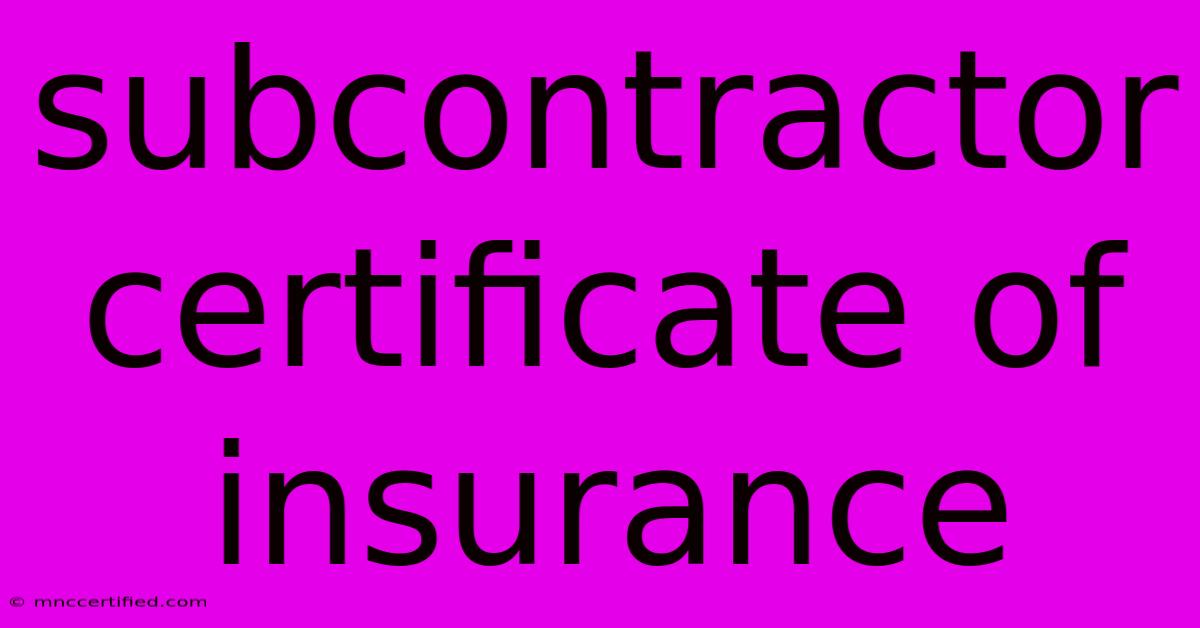Subcontractor Certificate Of Insurance

Table of Contents
Subcontractor Certificate of Insurance: Your Shield Against Liability
As a contractor or business owner, working with subcontractors is often a necessity. However, it's crucial to protect yourself and your business from potential liabilities. One vital step is to ensure your subcontractors carry the right insurance coverage. This is where the subcontractor certificate of insurance (COI) comes in.
What is a Subcontractor Certificate of Insurance?
A subcontractor certificate of insurance is a document that verifies the insurance coverage held by a subcontractor. It outlines the specific types of insurance policies they have, the limits of coverage, and the policy periods. This document serves as proof that your subcontractor is financially responsible for potential accidents, injuries, or property damage occurring during the course of their work.
Why is a Subcontractor COI Essential?
Protection from Financial Loss: Imagine a subcontractor's negligence leads to an accident on your job site. Without proper insurance, you could be held liable for injuries, property damage, or even legal fees. A COI ensures that your subcontractor's insurance will cover these expenses, safeguarding your business from significant financial strain.
Compliance with Legal Requirements: Many contracts and projects require subcontractors to provide proof of insurance. By requesting a COI, you ensure you're meeting these legal obligations and avoiding potential penalties or contract breaches.
Peace of Mind: Knowing your subcontractors have adequate insurance coverage provides peace of mind and allows you to focus on running your business effectively, knowing you're protected in the event of unforeseen circumstances.
What Information Should a Subcontractor COI Include?
A comprehensive subcontractor COI should contain the following key information:
- Subcontractor's Name and Contact Information
- Insurance Company Name and Contact Information
- Policy Numbers
- Types of Insurance Covered:
- General Liability Insurance: Protects against bodily injury and property damage caused by the subcontractor's work.
- Workers' Compensation Insurance: Covers medical expenses and lost wages for employees injured on the job.
- Commercial Automobile Insurance: Protects against damages caused by the subcontractor's vehicles.
- Umbrella Liability Insurance: Provides additional coverage beyond the limits of other policies.
- Limits of Liability: The maximum amount the insurer will pay for each claim.
- Policy Period: The dates when the insurance coverage is in effect.
- Certificate Holder: This should be your company, indicating you are a designated beneficiary of the insurance policy.
How to Obtain a Subcontractor Certificate of Insurance
- Request a COI: Contact your subcontractor and request a certificate of insurance.
- Provide Specific Requirements: Clearly communicate your insurance requirements, including the types of coverage needed and the minimum limits of liability.
- Verify the Information: Carefully review the COI to ensure it meets your requirements and is valid.
- Update the COI Regularly: Check the expiration date and request a new COI before it expires.
Conclusion:
The subcontractor certificate of insurance is an essential document for protecting your business and safeguarding your financial interests. By carefully reviewing and maintaining COIs from your subcontractors, you can create a safe, compliant, and secure work environment for everyone involved. Remember, proactive steps like obtaining a COI are critical for mitigating risks and achieving peace of mind in your contracting endeavors.

Thank you for visiting our website wich cover about Subcontractor Certificate Of Insurance. We hope the information provided has been useful to you. Feel free to contact us if you have any questions or need further assistance. See you next time and dont miss to bookmark.
Featured Posts
-
Illinois Assault Weapons Ban Blocked By Judge
Nov 09, 2024
-
Commercial Auto Insurance Charlotte Nc
Nov 09, 2024
-
Onegroup Risk Management And Insurance
Nov 09, 2024
-
Does Renters Insurance Cover Broken Tv
Nov 09, 2024
-
Cost Of Attorney Malpractice Insurance
Nov 09, 2024